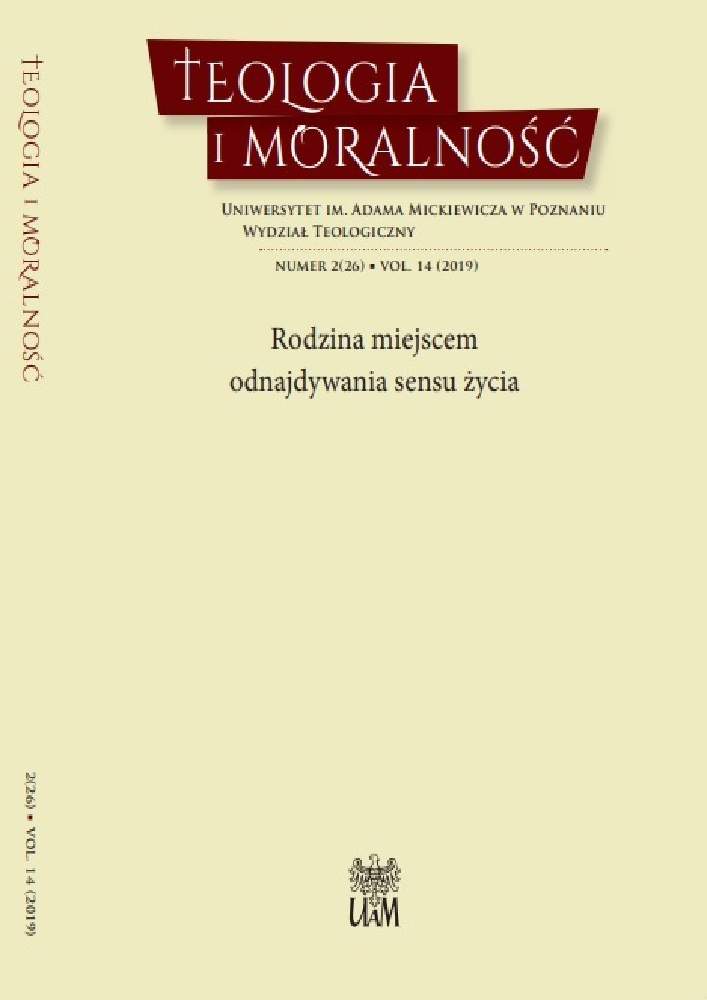Abstract
The analysis undertaken in this article aimed to answer the question of how an individual discovers/constructs the meaning of life. This analysis was carried out from the perspective of the sociological theory of Margaret S. Archer – named by her the morphogenetic approach. This approach has also been deepened with references to the neo-Thomistic philosophy of education. The analysis was divided into four parts, in which the following issues were raised in sequence: (1) contemporary cultural understanding of the issue of discovering/constructing the meaning of life; (2) the sociological theory of Margaret Archer; (3) the concept of discovering/constructing the meaning of life derived from Archer’s theory; (4) the conditions of this process created by the community. The analysis leads to the conclusion that the meaning of life is discovered by the individual in so-called ultimate care in direct cognition; that is, it is not mediated in culture while culture itself (including education) supports the individual in naming and understanding what is important, indicating ways of caring about what is important. This statement leads to the conclusion that the discovery of the meaning of life by an individual is conditioned by the structure of community life which is either ready to include the individual in concern for the common good or excludes the individual from the community.
References
Archer M. (1988), Culture and Agency. The Place of Culture in Social Theory, Cambridge.
Archer M. (1995), Realist Social Theory: the morphogenetic approach, Cambridge.
Archer M. (2006), Persons and Ultimate Concerns: Who We Are Is What We Care About. Conceptualization of the Person in Social Sciences, “Pontifi cal Academy of Social Sciences, Acta” 11, s. 261-283.
Archer M. (2013), Człowieczeństwo. Problem sprawstwa, Kraków.
Archer M., Collier A., Porpora D. (2004), Transcendence. Critical realism and God, London–New York.
Böhner P., Gilson É. (1962), Historia fi lozofi i chrześcijańskiej, Warszawa.
Bronk A. (1998), Zrozumieć świat współczesny, Lublin.
Eagleton T. (2008), The Meaning of Life: A Very Short Introduction, Oxford.
Horowski J. (2015), Wychowanie moralne według pedagogiki neotomistycznej, Toruń.
Horowski J. (2018), Social maladjustment as a result of exclusion from social life. Refl ections from the point of view of the Neo-Thomistic philosophy of education, “Studium Educationis” 3, s. 23-34.
Hussain W. (2018), The Common Good, w: The Stanford Encyclopedia of Philosophy, red. E.N. Zalta, https://plato.stanford.edu/archives/spr2018/entries/common-good/ [dostęp: 20.03.2019].
Janaszek-Ivaničková H. (1996), Od modernizmu do postmodernizmu, Katowice.
Kochel J. (1991), Formacja chrześcijańska według czterech Ewangelii w koncepcji kardynała Carlo Marii Martiniego, „Horyzonty Wiary” 8, s. 23-33.
Krąpiec M.A. (2001), Dobro wspólne, w: Powszechna encyklopedia fi lozofi i, red. A. Maryniarczyk, Lublin, t. 2, s. 628-639.
Krąpiec M.A. (2005), Ja – człowiek, Lublin.
Lyotard J.-F. (1997), Kondycja ponowoczesna, „Sztuka i Filozofi a” 13, s. 25-35.
Maritain J. (2005), Nauka i mądrość, Warszawa–Ząbki.
Martini C.M. (1999), Głosić Jezusa. Medytacje nad Ewangelią św. Łukasza, Kraków.
Metz T. (2007), New Developments in the Meaning of Life, “Philosophy Compass” 2, s. 196-217.
Metz T. (2013), The Meaning of Life, w: The Stanford Encyclopedia of Philosophy, red. E.N. Zalta, https://plato.stanford.edu/archives/sum2013/entries/life-meaning/ [dostęp: 20.03.2019].
Michalski J.T. (2011), Sens życia a pedagogika. Impulsy myśli Viktora E. Frankla, Toruń.
Mrozowicki A. (2013), Człowieczeństwo: struktura i sprawstwo w teorii socjologicznej Margaret
S. Archer, w: M.S. Archer, Człowieczeństwo. Problem sprawstwa, Kraków, s. VII-XL.
Sadłoń W. (2015), Kapitał społeczny a moralność, w: Leksykon socjologii moralności, red. J. Mariański, Kraków, s. 272-277.
Sadłoń W. (2016), Edukacja religijna jako kierunek badań interdyscyplinarnych, w: Tradycja i innowacja w polu refl eksji socjologii religii, red. S. Zaręba, I. Borowik, Warszawa, s. 109-126.
Schinkel A., De Ruyterand D.J., Aviram A. (2016), Education and Life’s Meaning, “Journal of Philosophy of Education” 3, s. 398-418.
Starnawski W. (2008), Prawda jako zasada wychowania, Warszawa.
Swieżawski S. (1995), Święty Tomasz na nowo odczytany, Poznań.
Wojtyła K. (1994), Osoba: podmiot i wspólnota, w: K. Wojtyła, Osoba i czyn oraz inne studia antropologiczne, Lublin, s. 371-414.
Woroniecki J. (2002), U podstaw kultury katolickiej, Lublin.
Wrońska K. (1999), Karola Wojtyły teoria uczestnictwa jako podstawa formułowania personalistycznej koncepcji wychowania społecznego, „Paedagogia Christiana” 4, s. 24-36.
Zawojska T. (2017), Wychowanie oparte na wartościach chrześcijańskich jako odpowiedź na poczucie kryzysu sensu we współczesnym świecie, „Paedagogia Christiana” 20, s. 33-49.
Zwergel H. A. (2001), Potrzeba tożsamości i sensu w (post)modernistycznym świecie – wyzwanie dla szkolnej lekcji religii, „Paedagogia Christiana” 8, s. 9-20.
License

This work is licensed under a Creative Commons Attribution-NoDerivatives 4.0 International License.

